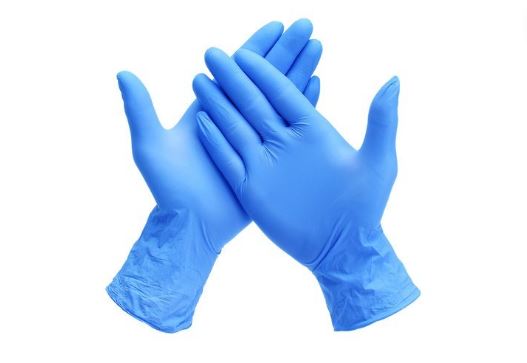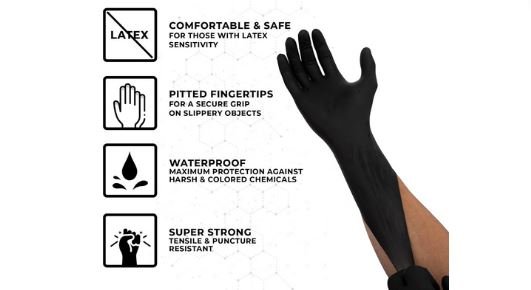Disposable gloves come in a variety of materials including vinyl, polyethylene, latex, and nitrile. Ideally, the gloves you choose should match your needs. While all of them offer protection not all are safe for food.
As such, nitrile gloves are desirable when it comes to food handling.
In fact, they are widely used in several commercial setups to offer food safety as well as safety to the food handler. The question, however, remains:
Are Nitrile Gloves Food Safe?
Quite simply yes! Nitrile gloves are food-safe.
Let me walk you through how.
There are different grades of nitrile gloves namely; industrial grade, food grade, and medical grade. Generally, nitrile gloves are synthetic, latex-free gloves.

They not only provide safety to the wearer but also prevent contamination of food. Here are some of the factors that make nitrile gloves safe for food:
Factors that make Nitrile Gloves Safe for Food Handling
· Nitrile Gloves are Non-porous
By being non-porous, they block oil, water, and chemicals from absorbing into your hands. It’s important to select the appropriate thickness of gloves based on the tasks. Light tasks such as cleaning require thinner gloves as compared to handling heavy tasks.
· They are Chemical Resistant
Its chemical resistance prevents it from wear and tear once exposed to chemicals. This not only ensures the safety of the food handler but also prevents food contamination as a result of tears.
· It is Powder-free
Powdered gloves are known to trigger allergic effects. In that case, using powder-free nitrile gloves prevents this and any possibility of food contamination from the powder.
· Nitrile Gloves have a High Tensile Strength
They are made using synthetic rubber so they can withstand punctures, abrasive materials, cuts, and liquids among others.
This ensures food safety and the safety of food handlers. Not forgetting that they come in different levels of thickness which also enhances their strength.
· Nitrile Materials Pass Quality Test for Gloves Manufacturing
Most if not all Nitrile gloves undergo quality tests. Acceptable Quality level (AQL) is a good example. This is a quality standard that regulates pinhole defects on gloves.
It requires that only 25 out of 1000 gloves should have pinholes. Meaning that the AQL should not exceed 2.5.
· Available in Different Colors
Nitrile gloves come in an array of colors that can be used to differentiate different kitchen tasks. By so doing cross-contamination of food is greatly avoided.
Other additional features that enhance food safety through the use of nitrile gloves include them being;
- Latex free
- Phthalate-free
- MBT-free
- BPA-free
- Vinyl-free
Powdered vs Powder-free Gloves
As the name implies, powdered gloves are designed to keep hands dry by using cornstarch powered as a coat. In as much as it’s practical, it poses a higher risk of food contamination.

Every time powdered gloves are used, they leave the powder residue on the food handler’s hand.
As such, the food handler needs to frequently wash off the cornstarch powder which can also cause allergic reactions.
Also, taking the gloves on and off could potentially transfer the powder to other surfaces and food resulting in food contamination.
Not to mention other potential risks factors such as inflammation of the airways as a result of inhaling the cornstarch.
Alternatively, powder-free gloves are manufactured using polymer coating and chlorination.
As such, the powder-free gloves still keep your hands dry and ensure no residues are left on your hands once you remove them. Also, this reduces the health and safety risks associated with having transferrable cornstarch powder.
Safety Precautions of Nitrile Gloves
In as much as nitrile gloves ensure safety, you need to observe the following precautions to maximize their effectiveness.
· Get the Right Fit
A loose glove can easily slip off while a tight one can be uncomfortable as well as lack maximum protection. Therefore, it’s crucial to select the right fit if so, you want to fully experience the safety benefits of nitrile gloves.
· Frequently change your Nitrile Gloves
Change your gloves often to avoid cross-contamination of food. Also, gloves might develop damage with time such as holes and thus the need to change them often.
· Avoid Contact with Face
Touching your face or any other part of your skin while using nitrile gloves decreases its effectiveness. Keep in mind your face is not protected so there is a high risk of transferring bacteria into the food.
· Get the Right Thickness
Using a thin nitrile glove for heavy -duty tasks might result in tear which in turn might cause contamination of food.
Safety Certifications and Standards for Nitrile Gloves
Nitrile gloves must undergo some safety tests and have required certifications before they’re released to the market.
FDA (Food and Drug Administration) is one of the common food standards that require that the material used to make gloves should be food-safe. It certifies that nitrile gloves offer a similar level of protection similar to other approved personal protective equipment.

In addition to that, there is AQL which is used to standardize pinhole defects. The acceptance quality level (AQL) should not exceed 2.5. In other words, the pinhole defaults shouldn’t exceed 2.5.
This means for every 1000 gloves, only 25 should be faulty.
There’s also the 510 certification which is granted by the FDA to the manufacturer after the gloves meet the required standards. Nitrile gloves must undergo all tests and have AQL to get 510 certifications which finally confirms that the gloves are food-safe.
Why Should You Choose Nitrile Gloves for Food Safety?
- They are not only resistant to chemicals but also oils.
- Nitrile gloves are durable
- They have a high tensile strength which makes them stronger and further enhances their durability.
- Nitrile gloves are allergen-free. Latex, a key element that causes allergic reactions is not present in nitrile gloves.
- Has excellent sensitivity and thus allows you to precisely handle foodstuff and have a comfortable fit.
- They are also lightweight and can be easily disposed of.
- Nitrile gloves are best for food safety
- There are zero harmful toxins present in nitrile gloves.
The only drawback with nitrile gloves is that they are costlier as compared to their counterparts.
Generally, non-powdered nitrile gloves have proved to be the best gloves on food safety to date.

